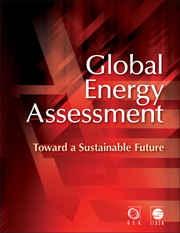 The Global Energy Assessment (GEA) involves specialists from a range of disciplines, industry groups, and policy areas in defining a new global energy policy agenda, one that transforms the way society thinks about, uses and delivers energy and to facilitate equitable and sustainable energy services for all, in particular the two billion people who currently lack access to clean, modern energy.
The Global Energy Assessment (GEA) involves specialists from a range of disciplines, industry groups, and policy areas in defining a new global energy policy agenda, one that transforms the way society thinks about, uses and delivers energy and to facilitate equitable and sustainable energy services for all, in particular the two billion people who currently lack access to clean, modern energy.
Coordinated by the International Institute for Applied Systems Analysis (IIASA), GEA is led by some of the world leading energy experts, in research, academia, business, industry and policy, representing both the developed and the developing world. GEA is the first ever fully integrated energy assessment that analyzes energy challenges, opportunities and strategies, for developing, industrialized and emerging economies. It is supported by government and non-governmental organizations, the United Nations Systems, and the private sector.
The Assessment is subject to rigorous and independent analysis and review.
The Final Report: Published by Cambridge University Press, the GEA final report was launched during the Energy Day at Rio+20, and will be available for purchase in July 2012. A copy of the GEA Summary Document is available online. For a pre-order form and discount, please see the Cambridge University Press discount flyer.
Objectives:
The GEA to provides policy-relevant analysis and guidance to governments and intergovernmental organizations, decision-support material to the commercial sector (energy service companies, investors and others), and analysis relevant to academic institutions. It provides technical guidance for implementing measures aimed at mitigating climate change and sustainable consumption of resources, for example the GEA:
- proposes a portfolio of policies addressing global energy challenges;
- addresses climate change mitigation targets as outlined by the UNFCCC and other GHG mitigation initiatives;
- evaluates future commitments to the reduction of GHGs, for example, to levels 20+ percent below 1990-levels by 2020 and 50+ percent by 2050, and negative emissions before 2100; and
- examines resource and technology options and policies needed to achieve such targets.
GEA Governance
The GEA Council was the forum in which stakeholders provided guidance to the scientific experts conducting the Assessment. Council Members represented a comprehensive range of stakeholders from business NGOs, governments, and the United Nations System. The membership was geographically diverse, and includes members from OECD and developing countries. The GEA Executive Committee or "ExComm" was appointed the by Council and consists of more than 20 scientific experts from five continents. The ExComm led the research and, together with their respective writing teams, wrote the final Assessment.
Responsible for this page: Mathis Rogner
Last updated:
08 Apr 2013
Phone: (+43 2236) 807 0
Copyright © 2009-2011 IIASA